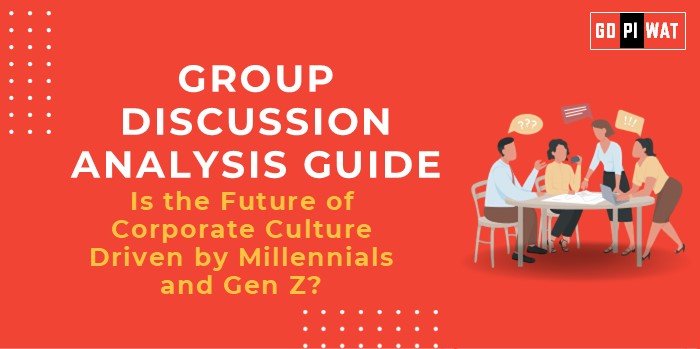📋 Group Discussion (GD) Analysis Guide
🌟 Topic: Is the Future of Corporate Culture Driven by Millennials and Gen Z?
🌐 Introduction to the Topic
Opening Context: “As millennials and Gen Z become the dominant workforce demographics, their values, aspirations, and work styles are reshaping corporate culture globally. By 2030, Gen Z alone will account for 30% of the global workforce, driving unprecedented cultural transformations.”
Topic Background: With the rise of remote work, emphasis on work-life balance, and demand for inclusivity and purpose-driven organizations, these generations have triggered a paradigm shift in corporate priorities. The future of corporate culture is no longer dictated solely by hierarchy and profits but increasingly by collaboration, ethics, and sustainability.
📊 Quick Facts and Key Statistics
- Millennials in Workforce: By 2025, millennials will comprise 75% of the global workforce.
- Gen Z Workforce Influence: 30% of the workforce will be Gen Z by 2030.
- Workplace Values: 76% of Gen Z prioritize diversity and inclusion (Deloitte, 2023).
- Tech Adaptability: Millennials and Gen Z favor digital tools for 70% of their tasks (PwC Survey, 2023).
- Attrition Rates: 41% of Gen Z workers are likely to leave their current employer within two years if they lack growth opportunities (Deloitte Millennial Survey, 2023).
🤝 Stakeholders and Their Roles
- Organizations: Restructure policies to attract and retain younger talent (e.g., hybrid work, mental health support).
- Employees (Millennials & Gen Z): Demand inclusivity, work-life balance, and technological innovation.
- Government & Regulators: Promote equitable labor laws supporting modern work environments.
- Technology Companies: Enable digital solutions for a more agile, flexible workplace.
🏆 Achievements and Challenges
🎉 Achievements
- Diversity and Inclusion Initiatives: Organizations now report a 30% improvement in innovation and performance with diverse teams (McKinsey, 2022).
- Hybrid and Flexible Work Models: Over 70% of millennials and Gen Z prefer flexible work hours, increasing productivity by 20% in some organizations.
- Technological Integration: Increased use of AI, collaboration tools, and automation improves efficiency.
⚠️ Challenges
- High Attrition Rates: Millennials and Gen Z frequently switch jobs, leading to higher HR costs.
- Leadership Gaps: Traditional leaders struggle to adapt to flatter hierarchies and employee-driven expectations.
- Work-Life Balance vs. Productivity: Balancing flexible work while maintaining company performance.
🌍 Global Comparisons
- United States: Companies like Google and Netflix lead by embracing flexible cultures and strong values.
- Europe: Scandinavian countries adopt progressive work-life balance models with four-day workweeks.
💬 Structured Arguments for Discussion
- Supporting Stance: “Millennials and Gen Z are revolutionizing workplace dynamics, prioritizing collaboration, technology, and ethics over traditional hierarchies.”
- Opposing Stance: “While younger generations influence workplace trends, core decision-making in corporations remains guided by older leadership.”
- Balanced Perspective: “The corporate future is shaped by millennial and Gen Z values, but collaboration between generations is crucial to balance innovation and experience.”
🛠️ Effective Discussion Approaches
- Opening Approaches:
- Data-Driven Start: “By 2025, millennials will dominate 75% of the global workforce—making their cultural impact undeniable.”
- Case Study: “Tech giants like Google have embraced millennial priorities like flexibility and purpose-driven missions.”
- Counter-Argument Handling:
- “While older leaders retain authority, they now increasingly align with millennial preferences, creating a blended culture that benefits all.”
🔍 Strategic Analysis: Strengths and Weaknesses
- Strengths: Technological adaptability, focus on work-life balance, emphasis on purpose-driven work.
- Weaknesses: Higher job-hopping rates, conflict with traditional leadership styles.
- Opportunities: Integration of AI and digital tools, redefinition of leadership models.
- Threats: Cultural disconnect between generations, risk of burnout despite flexible work.
🎓 Connecting with B-School Applications
- Real-World Applications: Topics like leadership adaptability, corporate ethics, and employee engagement align with HR, operations, and organizational behavior modules.
- Sample Interview Questions:
- “How can companies balance millennial and Gen Z preferences with business performance?”
- “Do flexible work policies improve productivity or dilute workplace discipline?”
- Insights for B-School Students: Study leadership models adapting to millennial-driven cultures, analyze HR case studies on attrition and engagement strategies.


